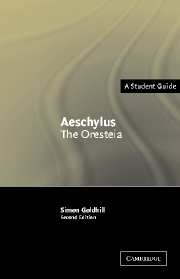2 - The Oresteia
Published online by Cambridge University Press: 05 June 2012
Summary
Introduction: plot and plotting
The action of the Oresteia – in the sense of entrances, exits, deaths, adulteries and the like – is relatively simple to explain. What makes the trilogy so extraordinary is the intricate apparatus of explanation, comment and discussion with which its thrillingly dramatic central actions are surrounded.
In the Agamemnon, Agamemnon returns home, victorious from Troy after a ten-year siege, and he is killed by his wife, Clytemnestra, who has been plotting with her lover, Aegisthus. In the Choephoroi, Orestes, the son of Clytemnestra and Agamemnon, returns from exile, has a reunion with his sister, Electra, and tricks his way into the palace where he kills Aegisthus and his mother. He flees, maddened by the Furies. In the Eumenides, Orestes is in Delphi, where he is purified by Apollo; but he is still pursued to Athens by the Furies, where he is the subject of the first murder trial in the court of the Areopagus. The Furies prosecute, Apollo defends. Orestes escapes by the narrowest of margins, thanks to the intervention of Athene, who presides over the case. The Furies are persuaded out of their anger against Athens and, reconciled, take up abode there.
This bare outline of the action scarcely represents the narrative. In the Agamemnon, the return of the king is prepared for in two major ways. First, by three extremely long and complex choral odes that explore the moral, historical and social background to the war with Troy. Secondly, by three scenes.
- Type
- Chapter
- Information
- Aeschylus: The Oresteia , pp. 20 - 84Publisher: Cambridge University PressPrint publication year: 2004



